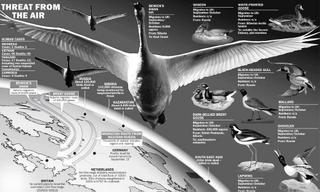HEWITT.MOBI
Wednesday, August 24, 2005
So, it's been a few days since I last posted. I went to the GUM clinic, I find the waiting about, to see the doctor really boring. Dr Hollows my doctor, said that the tests had not been done because the bloods got to the lab too late. Why am I not supprised about this ?. It's like taking so long to get the information I need so that I know what state my immune system is in. Because I don't know how long I've had the virus, within the time of my last blood test in 1999 this is the only information which lets me know how things are, so you'll understand why it's important. So begins the wait again, I should have the CD4 result within a few days, but the Viral load, can take three weeks !. Only when I have this information will I know what's going on.
On to a different topic, yesterday we went out. The weather was really nice, so we had a day out in Chester. Chester has lots of history going back to Roman times, & has the most complete city wall of any place in the United Kingdom. I have some photo's of the trip but it will be a few days before I can put any credit on the mobile & upload them here, so for now until that time here are some photo's of Chester I found on the www.
 The Unique Chester Rows
The Unique Chester Rows The City Wall
The City Wall The Roman Amphitheatre
The Roman Amphitheatre The Eastgate Clock
The Eastgate ClockChester Guide 2005 PDF - Download
Chester Attractions 2005 PDF - Download
We had a good day out & saw a lot of things, unusually it didn't even rain on us. It's good to spend a bit of time with my parents I don't get the opportunity very often.
An update on the bird flu -
 How the virus is transmitted
How the virus is transmittedThe Times
August 23, 2005
Europe steps up attempt to halt lethal pandemic
From Charles Bremner in Paris and Roger Boyes in Berlin
DUTCH poultry farmers complied with a government order to move all their birds indoors yesterday as Europe stepped up its efforts to prevent a potentially deadly bird flu pandemic this winter.
Germany plans to follow suit by ordering that all free-range birds be moved indoors in the middle of next month to prevent contact with birds arriving from the East that may be carrying the virus.
On Thursday experts from the European Union’s 25 member states are to meet in Brussels to co-ordinate contingency plans to combat the threat.
Britain and other EU states are monitoring poultry health closely and stocking vaccines for use in the event of an epidemic.
At the weekend Italy announced stricter import controls, heightened surveillance and accelerated vaccine production.
European worries about bird flu have mounted with evidence that H5N1, the latest strain, found in western China last month, has been moving steadily westwards. It has now reached Siberia and experts are saying that migratory fowl could bring it to Western Europe this autumn.
Discovered in China in 1997, bird flu has infected 112 human beings since 2003, killing 57 in Vietnam, Thailand, Cambodia and Indonesia. So far human beings who contracted the disease got it from handling birds, but the World Health Organisation fears that it might mutate into a human strain that could cause a global pandemic.
The Dutch have taken the most drastic action in Europe so far because the country was badly hit in the previous outbreak in 2003. The European Commission banned the import of live birds and feathers from Russia this month. Yesterday it insisted that its measures so far were adequate.
The Commission said: “We are following the situation closely, but we are not alarmist.” The authorities in Siberia and Kazakhstan ordered the slaughter of thousands of birds during the past two weeks and 142,000 chickens are being monitored as possibly infected on a poultry farm near Omsk, western Siberia.
The Commission said that it had been assured by Russia that reports of an outbreak west of the Urals, near the Caspian Sea, were false.
Experts have been predicting that ducks and other birds will carry the virus southwestwards as they flee the autumn chill, heading across the Black Sea and southern Europe.
Some 850,000 reach Britain later in the autumn every year, including the mallard and pochard ducks that are thought to have brought the disease from Asia to Russia.
While the EU and national officials played down the danger, some experts are talking of potential catastrophe on the scale of the 1919 influenza epidemic if H5N1 changes into a virus that can be transmitted from human being to human being. Tens of millions could die and the world economy could be pushed into its biggest slump since the Great Depression of the 1930s, pessimists say.
The Australian Government has plans to seal off the country from the world, closing air and sea ports, in the event of an Asian bird flu outbreak. Its contingency plan also calls for compulsory quarantine, closing schools, public transport and places of work.
French environmentalists are criticising the Government for complacency. Edir Delhaye, of Cap21, a small environmentalist party, said that France was especially vulnerable because of its large number of free-range poultry farms and the popularity of shooting migratory water birds. He said: “It is vital that we rapidly take measures like the Netherlands and Germany.”
The menace of bird flu could give a much-needed boost to the flagging fortunes of Gerhard Schröder, the German Chancellor, who faces a general election on September 18.
Renate Künast, the Agriculture Minister and a Green Party member, has been campaigning on a safety-first ticket.
“We have to proceed systematically and with an eye on the risks,” she said. The minister sees the biggest risk coming from the illegal animal trade.
The customs service has tightened controls on imported birds. German travellers have been warned against visiting bird markets and any kind of livestock trading centre east of the Urals.
HOW BIG A DANGER ARE WE FACING AND CAN WE PROTECT OURSELVES?
WHAT IS AVIAN FLU?
Also known as bird flu, it is an infectious disease in birds caused by several strains of the influenza virus. It was identified in Italy in 1878. All bird species are at risk, though some are more liable to infection than others.
The natural host for the virus is migratory waterfowl, such as wild ducks, who have a high resistance to infection. Domestic poultry are particularly susceptible.
The disease can be spread via bird droppings (which contaminate dust and soil) and farm equipment such as vehicles or clothing. The trade in live birds between countries has also caused the virus to spread.
WHAT HAPPENS TO BIRDS WHO GET IT?
The symptoms vary widely, from none or mild illness to highly contagious and rapidly fatal epidemics. The contagious form has sudden onset, severe illness and carries a death rate of nearly 100 per cent. The virus can alter from being low-risk to high-risk very quickly through genetic mutation.
WHERE IS THE DISEASE FOUND?
The H5N1 strain of avian flu has been found in Thailand, Vietnam, Indonesia, Cambodia, China, Hong Kong, Japan, the Philippines, Mongolia, Malaysia and North Korea. More recently it has spread to Russia and Kazakhstan. In 2003 there was an outbreak of the highly pathogenic H7N7 strain in the Netherlands and Germany.
HOW MANY BIRDS ARE AFFECTED?
In the latest outbreak, which started in late 2003, more than 150 million birds have been killed or culled in South East Asia alone. The total number affected is expected to be much higher.
WHAT IS THE DANGER TO HUMAN BEINGS?
Avian flu currently poses only a small danger, as the virus does not normally infect animals other than birds or pigs. However, human beings have been infected in Vietnam, Thailand, Cambodia and Indonesia, although these cases were linked to direct contact with dead or diseased poultry. One case of human-human contact was suspected in Thailand last year. There is no vaccine to prevent H5N1 infection in human beings, although there are drugs to treat the illness.
WHY ARE SCIENTISTS WORRIED?
When H5N1 has infected human beings it is exceptionally lethal — of 112 confirmed cases, 57 have died. The concern is that this strain will mutate so that it can be easily passed on from one person to another — if this happens, the result could be a pandemic as serious as the 1918-19 “Spanish flu” that killed between 20 million and 40 million people.
Source: World Health Organisation
That's about it for the moment.....
Charlie
hewitt.mobi Posted at 6:54 am |
0 comments
0 Comments:





